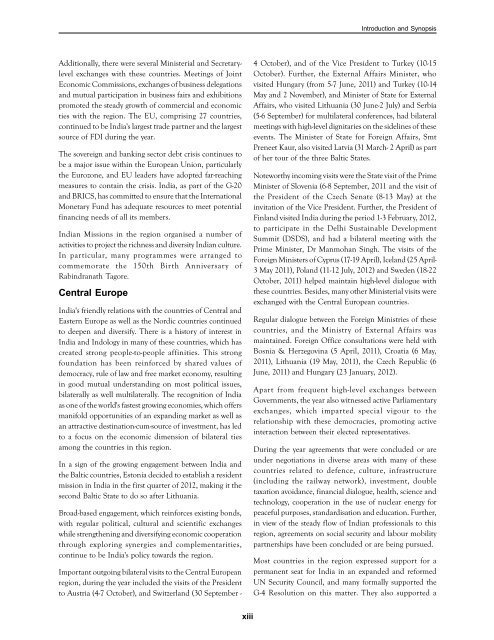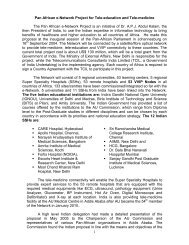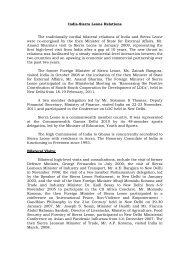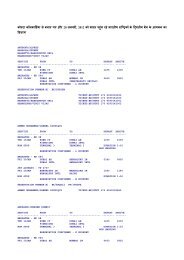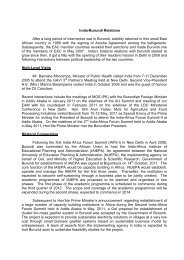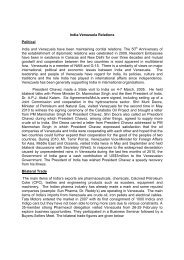Annual Report 2011 - 2012
Annual Report 2011 - 2012
Annual Report 2011 - 2012
Create successful ePaper yourself
Turn your PDF publications into a flip-book with our unique Google optimized e-Paper software.
Additionally, there were several Ministerial and Secretarylevel<br />
exchanges with these countries. Meetings of Joint<br />
Economic Commissions, exchanges of business delegations<br />
and mutual participation in business fairs and exhibitions<br />
promoted the steady growth of commercial and economic<br />
ties with the region. The EU, comprising 27 countries,<br />
continued to be India's largest trade partner and the largest<br />
source of FDI during the year.<br />
The sovereign and banking sector debt crisis continues to<br />
be a major issue within the European Union, particularly<br />
the Eurozone, and EU leaders have adopted far-reaching<br />
measures to contain the crisis. India, as part of the G-20<br />
and BRICS, has committed to ensure that the International<br />
Monetary Fund has adequate resources to meet potential<br />
financing needs of all its members.<br />
Indian Missions in the region organised a number of<br />
activities to project the richness and diversity Indian culture.<br />
In particular, many programmes were arranged to<br />
commemorate the 150th Birth Anniversary of<br />
Rabindranath Tagore.<br />
Central Europe<br />
India's friendly relations with the countries of Central and<br />
Eastern Europe as well as the Nordic countries continued<br />
to deepen and diversify. There is a history of interest in<br />
India and Indology in many of these countries, which has<br />
created strong people-to-people affinities. This strong<br />
foundation has been reinforced by shared values of<br />
democracy, rule of law and free market economy, resulting<br />
in good mutual understanding on most political issues,<br />
bilaterally as well multilaterally. The recognition of India<br />
as one of the world's fastest growing economies, which offers<br />
manifold opportunities of an expanding market as well as<br />
an attractive destination-cum-source of investment, has led<br />
to a focus on the economic dimension of bilateral ties<br />
among the countries in this region.<br />
In a sign of the growing engagement between India and<br />
the Baltic countries, Estonia decided to establish a resident<br />
mission in India in the first quarter of <strong>2012</strong>, making it the<br />
second Baltic State to do so after Lithuania.<br />
Broad-based engagement, which reinforces existing bonds,<br />
with regular political, cultural and scientific exchanges<br />
while strengthening and diversifying economic cooperation<br />
through exploring synergies and complementarities,<br />
continue to be India's policy towards the region.<br />
Important outgoing bilateral visits to the Central European<br />
region, during the year included the visits of the President<br />
to Austria (4-7 October), and Switzerland (30 September -<br />
xiii<br />
Introduction and Synopsis<br />
4 October), and of the Vice President to Turkey (10-15<br />
October). Further, the External Affairs Minister, who<br />
visited Hungary (from 5-7 June, <strong>2011</strong>) and Turkey (10-14<br />
May and 2 November), and Minister of State for External<br />
Affairs, who visited Lithuania (30 June-2 July) and Serbia<br />
(5-6 September) for multilateral conferences, had bilateral<br />
meetings with high-level dignitaries on the sidelines of these<br />
events. The Minister of State for Foreign Affairs, Smt<br />
Preneet Kaur, also visited Latvia (31 March- 2 April) as part<br />
of her tour of the three Baltic States.<br />
Noteworthy incoming visits were the State visit of the Prime<br />
Minister of Slovenia (6-8 September, <strong>2011</strong> and the visit of<br />
the President of the Czech Senate (8-13 May) at the<br />
invitation of the Vice President. Further, the President of<br />
Finland visited India during the period 1-3 February, <strong>2012</strong>,<br />
to participate in the Delhi Sustainable Development<br />
Summit (DSDS), and had a bilateral meeting with the<br />
Prime Minister, Dr Manmohan Singh. The visits of the<br />
Foreign Ministers of Cyprus (17-19 April), Iceland (25 April-<br />
3 May <strong>2011</strong>), Poland (11-12 July, <strong>2012</strong>) and Sweden (18-22<br />
October, <strong>2011</strong>) helped maintain high-level dialogue with<br />
these countries. Besides, many other Ministerial visits were<br />
exchanged with the Central European countries.<br />
Regular dialogue between the Foreign Ministries of these<br />
countries, and the Ministry of External Affairs was<br />
maintained. Foreign Office consultations were held with<br />
Bosnia & Herzegovina (5 April, <strong>2011</strong>), Croatia (6 May,<br />
<strong>2011</strong>), Lithuania (19 May, <strong>2011</strong>), the Czech Republic (6<br />
June, <strong>2011</strong>) and Hungary (23 January, <strong>2012</strong>).<br />
Apart from frequent high-level exchanges between<br />
Governments, the year also witnessed active Parliamentary<br />
exchanges, which imparted special vigour to the<br />
relationship with these democracies, promoting active<br />
interaction between their elected representatives.<br />
During the year agreements that were concluded or are<br />
under negotiations in diverse areas with many of these<br />
countries related to defence, culture, infrastructure<br />
(including the railway network), investment, double<br />
taxation avoidance, financial dialogue, health, science and<br />
technology, cooperation in the use of nuclear energy for<br />
peaceful purposes, standardisation and education. Further,<br />
in view of the steady flow of Indian professionals to this<br />
region, agreements on social security and labour mobility<br />
partnerships have been concluded or are being pursued.<br />
Most countries in the region expressed support for a<br />
permanent seat for India in an expanded and reformed<br />
UN Security Council, and many formally supported the<br />
G-4 Resolution on this matter. They also supported a


